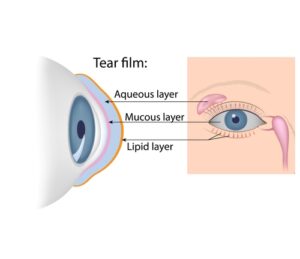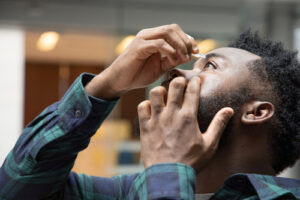Are your eyes dry, itchy, or watery? These are some common signs that come with having dry eyes.
While this time of year can bring all kinds of winter fun, it can also wreak havoc on dry eyes. There are a few reasons dry eyes are more common during winter.
Cooler, breezy conditions outside and heating inside can make your eyes feel drier, leading to irritation and blurriness. When you’re busy, it’s easy to overlook the importance of staying hydrated and maintaining a healthy diet.
Enjoying all your favorite winter activities when your eyes are bothering you is tough. Keep reading for seven tips to try if your eyes feel dry and irritated this season!
1. Drink More Water
Are you drinking enough water? Dry eyes can occur when your eyes are unable to produce enough tears.
Proper hydration allows your body to create the tears needed to keep your eyes moist and hydrated. Drink at least eight eight-ounce glasses of water daily to ensure your eyes feel well-lubricated.

Drinking enough water will make a difference beyond your eyes but for your health and skin as well. It may feel like you’re drinking enough water, but if your eyes are dry or scratchy, you may not get the recommended amount.
Try recording how much you drink in a day. Knowing how much water you drink is the only way to ensure your body has what’s necessary to produce enough healthy tears.
In addition to water, other healthy liquids are also recommended if you’re suffering from dry eyes. The winter season is a great time for soups and teas. They’ll help keep you warm and cozy while supporting your eye health.
2. Add More Omega-3 Fatty Acids to Your Diet

Like your liquid intake can support healthy eye moisture, your diet also plays a role. Omega-3 fatty acids can alleviate the symptoms of dry eye.
Healthy tears contain oils, water, and mucus. If your tears do not have all the necessary components, your tears cannot properly lubricate your eyes.
Consuming enough omega-3 fatty acids can help aid in the production of oil in your tears. You can find omega-3 fatty acids in many delicious foods, such as fish, leafy vegetables, nuts, and walnuts. Vegetable oils, flaxseed, and fish oils are good sources as well.
As a bonus, omega-3 fatty acids can lower your risk of developing other eye-related conditions, like macular degeneration and glaucoma.
3. Remember to Blink and Follow the 20-20-20 Rule

You may not give much thought to how often you blink. But did you know that you naturally blink less whenever you look at a screen?
Every time you blink, tears spread across your eyes. These tears help keep your eyes moist, allow you to see comfortably, and let you see clearly.
Your tears also clear away any debris or particles on your eye. For these reasons, it’s a good habit to remind yourself to blink, especially when looking at a screen. A soft, natural blink aids your eyes and ensures that they do not get too dry while you spend time in front of a screen or digital device.
The 20-20-20 rule can also help your eyes stay moisturized. Whether you’re looking at a phone, tablet, TV, computer, or any other screen, take a break by looking away every twenty minutes.
Continue by finding something to look at that’s at least twenty feet away for twenty seconds. Practicing the 20-20-20 rule gives your eyes a much-needed break and is an excellent time to blink or use artificial tears if you have them nearby.
4. Soothe Irritation with Warm Compresses
When your eyes are feeling scratchy, itchy, or otherwise irritated, avoid the urge to rub them. Rubbing your eyes can make dry eye symptoms worse.
Instead, try a warm compress to get the relief you need without hurting your eyes. Wet a washcloth with warm water (make sure it’s not too hot), place it over your eyes, and relax.
The heat opens up tear-producing glands in your eyes. It also stops tears from evaporating too quickly.
5. Keep Eye Drops and Artificial Tears on Hand

Eye drops or artificial tears can replace the moisture your eyes are missing. You can conveniently find them over the counter in pharmacies and other stores.
It’s a good idea to keep some on hand, even if your eyes aren’t bothering you at the time. Use eye drops or artificial tears before your eyes start feeling irritated to avoid further discomfort.
6. Modify Your Environment with a Humidifier
The environment around you can affect your eyes in ways you don’t even realize. During the colder months (even in Austin), heating systems can dry out the air in your home. When the air around you is dry, it can make your eyes dry too.
Many patients find that a humidifier can help return some of the missing moisture to the air, easing their dry eye symptoms. If your eyes are irritated, consider placing a humidifier in the rooms of your home where you spend the most time.
You may want to put a humidifier in your bedroom and buy another for your office to ensure your eyes stay comfortable no matter where you are.
7. Talk to Your Eye Doctor If Your Symptoms Worsen or Don’t Improve
Certain lifestyle changes can help to alleviate dry eye symptoms, but they are not always enough. If you’ve tried making small lifestyle changes and your dry eyes still bother you or worsen, talk to your eye doctor about your treatment options.

Here at Dell Laser Consultants, our ophthalmologists specialize in advanced treatments for dry eye syndrome. Depending on the severity of your symptoms and their root cause, our team can recommend artificial tears, gels, wipes, and ointments that improve moisture in your eyes.
In addition, punctal plugs, tiny devices placed in the eye, can help the eye maintain a healthy level of tears. Another treatment option is LipiFlow®.
LipiFlow is a treatment that warms and massages the glands in the eye to remove any blockages impacting tear production. BlephEx™ is another treatment capable of clearing blockages and debris along the eyelids for patients with dry eyes or blepharitis.
Are dry, irritated eyes still troubling you, even after trying these tips? Schedule an appointment at Dell Laser Consultants in Austin, TX, today!





